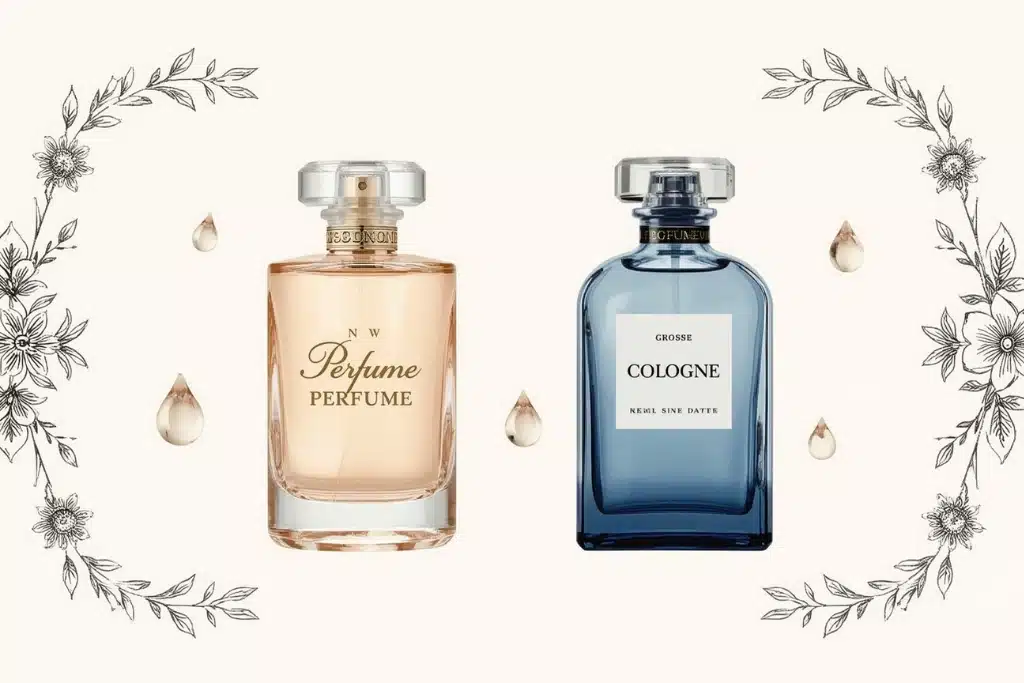When choosing a fragrance, the terms perfume vs cologne often create confusion. Are they the same? Why do their labels look similar yet feel so different? And, most importantly, how do you decide which one to pick?
If you’ve had these questions, you’re not alone. The sheer variety of fragrances on the market can make it challenging to find the right one, but understanding the key differences can simplify the decision-making process.
But don’t worry—by learning the key differences between cologne and perfume, you’ll know exactly what you’re looking for. Whether you’re buying a new fragrance or curious about cologne for women, this guide will clear up your doubts.
Perfume vs Cologne: The Key Differences Explained
Let’s break down the debate between perfume and cologne. The primary difference lies in the concentration of fragrance oils, which affects everything from longevity and sillage to price and ideal occasions.
Perfume: The Luxurious, Long-Lasting Fragrance
Perfume’s high concentration ensures it provides a bold, lasting scent. It’s perfect for occasions when you need a fragrance that lasts and makes an impact.
- Longevity: Perfume lasts significantly longer—usually 6 to 8 hours—so reapplication isn’t necessary.
- Sillage: Due to its richness, perfume leaves a stronger scent trail, making a lasting impression.
- Best For: Evening events, formal occasions, or when you need a fragrance that stands out.
- Price: Given the high concentration of essential oils, perfumes are generally more expensive than cologne.
Cologne: A Fresh and Subtle Choice for Everyday Use
Cologne, on the other hand, is lighter and subtler, containing only 2% to 5% fragrance oils. This lower concentration makes it ideal for daily use, offering a refreshing scent that’s not overpowering.
- Longevity: Cologne lasts about 2 to 3 hours, so it’s perfect for a quick refresh throughout the day.
- Sillage: The fragrance is gentler, leaving a more delicate scent trail.
- Best For: Day-to-day wear, casual settings, and warmer weather.
- Price: Colognes are typically more affordable due to the lower fragrance concentration.
Other Fragrance Types You Should Know About
While the perfume vs cologne debate is central, there are other fragrance types worth considering. Each offers a unique balance of intensity and longevity.
- With a moderate concentration of fragrance oils, Eau de Parfum provides a balanced scent that’s strong enough to last through the day, making it ideal for both day and night.
- Eau de Toilette (EDT): Contains 5% to 15% fragrance oils and lasts about 3 to 5 hours. Ideal for daytime wear or when you prefer a lighter scent.
- Eau Fraiche: Contains 1% to 3% fragrance oils and lasts less than 2 hours. Perfect for a quick refresh after exercise or in hot weather.
Is Cologne Just for Men?
Although cologne is often associated with men and perfume with women, fragrance is entirely gender-neutral. In fact, cologne for women is just as popular, often featuring fresh, light notes such as citrus or floral.
- Cologne for Women: Women’s colognes are usually lighter and more floral, while men’s tend to have woody or musky notes.
Fragrance is personal, and the best scent is one that makes you feel confident. There’s no need to follow gendered or traditional fragrance categories—choose what feels right for you.
How to Choose Between Cologne and Perfume
Choosing the right fragrance can be tricky. By understanding the differences between perfume and cologne, you can make a decision that suits your preferences.
- Longevity: If you need a fragrance that lasts all day (or night), perfume or Eau de Parfum is your best choice. These offer 6+ hours of wear.
- Intensity: If you prefer a bold fragrance, go for perfume. If you’re looking for something subtle, cologne is the way to go.
- Occasion: Perfume is perfect for evening events, while cologne is better for daytime and casual settings.
- Climate: Cologne or Eau Fraiche is ideal for hot weather, while perfume holds up better in cold climates.
- Skin Type: People with dry skin may prefer stronger fragrances like Eau de Parfum, while those with oily skin may find cologne works better.
Fragrance Notes: Understanding the Layers of Scent
Whether you’re wearing cologne or perfume, it’s important to understand fragrance notes—the layers of scent that develop over time.
- The opening notes are the first impression of a fragrance, giving you an immediate sense of its character, typically light, fresh, or fruity.
- As the fragrance settles, the heart notes emerge. These tend to be richer and more complex, offering depth to the fragrance.
- Base Notes: These deeper, lasting notes—like sandalwood, amber, or vanilla in perfumes and musk in colognes—remain after the other notes have dissipated.
How to Make Your Cologne or Perfume Last Longer
Want your fragrance to last all day? Here are a few tips:
- Hydrate Your Skin: Well-moisturized skin holds fragrance better. Apply it after moisturizing.
- Pulse Points: Apply fragrance to pulse points like your wrists, neck, and behind your ears.
- Don’t Rub: Avoid rubbing your wrists together after applying fragrance, as it can break down the fragrance molecules.
Final Thoughts: Find Your Signature Scent
The right fragrance for you depends on your lifestyle, the environment you’re in, and how long you want it to last. There’s no one-size-fits-all answer, but knowing the differences helps you choose the best fit. Whether you choose a luxurious perfume, a light cologne, or even a women’s cologne, there’s a fragrance to complement your style perfectly.
Next time you’re in the market for a fragrance, look at the concentration labels and think about how long you want it to last. With this information, you’ll find the perfect fragrance for you!


